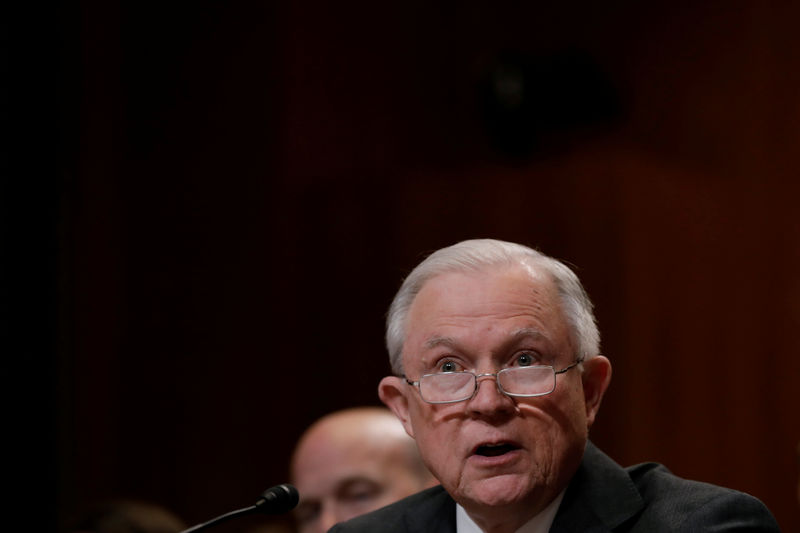By Sarah N. Lynch and Lisa Lambert
WASHINGTON (Reuters) - Questions about President Donald Trump and the investigation into whether his 2016 election campaign colluded with Russia overshadowed a Senate hearing on Wednesday with U.S. Attorney General Jeff Sessions, who has been a frequent target of Trump's wrath.
Sessions was the sole witness at the hearing on the Justice Department's proposed 2019 budget, where Democrats repeatedly drew the spotlight to the Russia probe.
In ways that could keep Trump's fury in check, Sessions delicately navigated questions on recusals, pardons and even the possible firing of high-ranking officials.
Sessions would not say if he had recused himself, or would, from an ongoing criminal investigation into Trump's personal attorney Michael Cohen or if he would consider resigning in protest should Trump decide to fire Special Counsel Robert Mueller or Deputy Attorney General Rod Rosenstein, who oversees the Russia probe.
He did risk irking his boss when he said he had full confidence in Rosenstein.
Trump has frequently railed against Sessions, saying he regretted tapping him as the country's top lawyer because of Sessions' decision to recuse himself from the Russia investigation. The president has also openly targeted other officials, including Mueller, and labeled the Russia investigation a "witch hunt."
"That calls for a speculative answer," Sessions told Senator Patrick Leahy, a Democrat, when asked if he would resign if either Rosenstein and Mueller was fired. "I am not able to do that."
When asked later for his legal opinion about the open question of whether Trump had the power to dismiss Mueller, Sessions said he was recused from answering.
Sessions declined to discuss any possible recusal in the Cohen probe, because that could lead to confirming or denying an investigation. The department has strict prohibitions against publicly discussing investigations.
"I have sought advice on those matters. I have not met with the top ethics person on it, but I can assure you I have not violated my recusal," he said.
The FBI raided Cohen's home and office earlier this month, partly on a referral from the special counsel, sending Trump to Twitter to bash the probe and department.
Trump's unorthodox attacks have prompted some critics to worry about to the independence of Justice Department investigations.
The hearing touched on almost every budget line for the department, from databases to immigration policy, frequently forcing Sessions to defend the Trump administration.
In one combative exchange with Democrat Chris Van Hollen, Sessions backed Trump's decision to pardon former Maricopa County Sheriff Joe Arpaio and Lewis "Scooter" Libby, an adviser to former Vice President Dick Cheney, without consulting Justice Department experts. In the same exchange, he attacked former President Bill Clinton for similar pardons.
"The pardons President Clinton made were stunning, shocking and unacceptable on the merits," Sessions said. "Arpaio was 80-something years of age and he was convicted of a misdemeanor."
